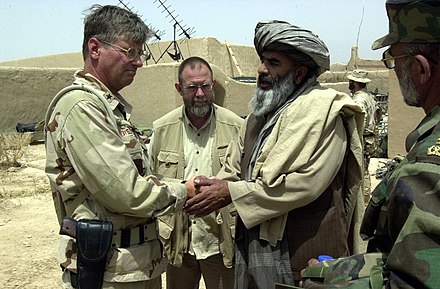Jan Mohammad Khan
Jan Mohammad Khan | |
|---|---|
 Khan with US Air Force Brigadier General Anthony Przybyslawski in 2002 | |
| Governor of Oruzgan, Afghanistan | |
| In office January 2002 – March 2006 | |
| Succeeded by | Maulavi Abdul Hakim Munib |
| Personal details | |
| Born | Afghanistan |
| Died | 17 July 2011 |
Jan Mohammad Khan (died July 17, 2011) was a politician in Afghanistan, who served as Governor of Oruzgan Province from January 2002 to March 2006, member of the National Assembly, and a special adviser to President Hamid Karzai.[1][2] He was an elder of the Popolzai Pashtun tribe in Oruzgan and a close ally of Hamid Karzai.[1]
Early years and personal life
Khan was illiterate. During the war against the Soviets he served as a commander in the Jamiat-e Islami political party of Afghanistan led by Burhanuddin Rabani in Uruzgan. He later joined Jabha-i-Nijat Milli or National Salvation Front, another jihadi movement led by Sibghatullah Mojaddedi, and remained with the group until the victory of the mujaheddin. He lost an eye during the fighting and in later years gave differing accounts of how he sustained the injury. He was Oruzgan's governor for nearly four years under President Burhanuddin Rabani. Khan quit his job during the Taliban era and spent three years in a Kandahar jail on charges of working for former King Zahir Shah.
Khan was a close friend of Karzai's father, Abdul Ahad Karzai, and was believed to mediate disputes among the Karzai brothers.
In early 2002, Karzai appointed Khan as Oruzgan's governor, a position he held until March 2006. Khan was widely seen as incompetent, corrupt, closely tied to the opium poppy trade, and inclined to favor his own Populzai tribe at the expense of Oruzgan's other tribes. Thus no western governments objected when President Karzai replaced Khan as governor, giving him a nominal job in the Ministry of Tribal Affairs. In fact, Khan continued to meddle in Oruzgan's political affairs, often acting through his nephew, Matioolah Khan, a powerful and feared militia leader in the province.
Khan had four wives, from whom he had a total of 18 daughters and 16 sons, the oldest of whom was born around 1981.[3] A fifth wife died under mysterious circumstances amid rumors that Khan had her killed.
Governorship and dismissal

Khan was appointed governor of Orugzan province in 2002. He was replaced by Maulavi Abdul Hakim Munib ("Maulavi" is a title indicating religious training) on March 18, 2006. The Dutch military assumed control from the U.S. of the Provincial Reconstruction Team four months after Khan's departure. Khan returned to the province frequently in the ensuing years, meddling unhelpfully in local politics. The Dutch left Oruzgan in 2010, leaving the U.S. and Australia to continue the mission there.[4]
Assassination
On July 17, 2011, gunmen stormed Khan's home in Kabul and killed him and MP Hasham Watanwal also of Oruzgan. Some sources report that his bodyguards were killed as well.[5][6] The attack began with a small explosion and bursts of gunfire, according to eyewitnesses.[7] While one attacker was killed, at least one other attacker blew himself up.[8] Some reports indicated a third attacker occupied Khan's home and were involved in an hours-long firefight with the Afghan National Army and the Afghan National Police.[5] Afghan law enforcement had captured one attacker, who was carrying an AK-47 and a grenade launcher, while another attacker continued the firefight from a bathroom.[6] SAS members of New Zealand were assisting and mentoring the Afghan security forces during the incident.[9]
The Taliban took responsibility for Khan's killing.[5][7] They stated that Khan's killing was a punishment for all his deeds in the past, but members of the Afghan National Assembly accused Pakistan's Inter-Services Intelligence (ISI).[10] Afghanistan often blames Pakistan's ISI for supporting "terrorist" attacks inside Afghanistan.[11] Bismillah Khan Mohammadi, the Interior Minister of Afghanistan, stated that the mobile phones recovered from the attackers showed incoming calls from Pakistan right before conducting the assassination.[12] Others recall that Khan made many local enemies in southern Afghanistan over the years, within his own and competing tribes, and his death may have been the result of such a local feud.
References
- ^ a b "Doing the bidding of organised crime". The Sydney Morning Herald. August 22, 2009. Retrieved 2011-07-16.
- ^ Coalition Forces Land Component Command (March 21, 2005). "CFLCC Today". United States Department of Defense. Archived from the original on 2007-10-10. Retrieved 2007-11-30.
- ^ "Lives of Jan Mohammad Khan and Hasham Watanwal". Pajhwok Afghan News. July 18, 2011. Retrieved 2011-07-18.
- ^ "Opvolgers in Uruzgan laten 'Dutch approach' varen". de Volkskrant. December 30, 2010. Retrieved 2011-07-17.
- ^ a b c Ariosto, David (July 17, 2011). "Gunmen kill Karzai adviser, lawmaker". CNN.
- ^ a b "Afghanistan: Senior aide to President Karzai killed". BBC News. 17 July 2011.
- ^ a b Abi-Habib, Maria; Sultani, Zia (July 18, 2011). "Senior Aide to Karzai Is Killed in Attack". Wall Street Journal.
- ^ "The Latest News from the UK and Around the World".
- ^ "SAS involved in Kabul firefight". One News. July 18, 2011. Retrieved October 6, 2011.
- ^ "MPs blame ISI for the attack". Pajhwok Afghan News. July 18, 2011. Retrieved 2011-07-18.
- ^ Afghan, Pakistan presidents meet amid new tensions
- ^ Khan's killers received calls from Pakistan: minister